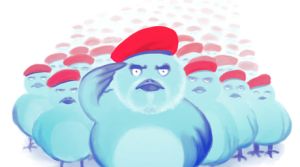Alternative Twitter-verse



How the hegemony wants social networks to be…
You probably know about the strange case of the fake child kidnapping that has served as an excuse for Prosecutor General Luisa Ortega Diaz to propose to regulate social networks. Not that she has not tried to do so before…
Regardless of the strange circumstances that motivated her proposal, or the context in which her proposal was made public, what matters is that this new regulation is, for all practical purposes really unnecessary.
Why?
Because there’s already the legal framework for that. Back in 2010, the National Assembly changed the Social Responsibility Law for Radio and Television in order to include the Internet (and ergo, social networks).
There’s no excuse for the State not to act. Matter or fact, it already has.
People have been detained for posting photos online. Some Twitter users are already in jail, imprisoned since last year. Some political prisoners have been legally banned to use Twitter, and now using social media is even considered evidence of “violence”.
Still, there’s a seemingly-legit reason behind this proposal: Reinforcing the role of the communicational hegemony in Twitter.
After all, the hegemony has branched out with both a Vice-Ministry exclusively dedicated to social networks, and the so-called “TROPA” (the troop, nickname for pro-government organized Twitter users). Even Nicolas Maduro himself is following the online steps of the comandante eterno and called on his supporters to “defend the truth in the social networks”. But he’s not doing a great job so far, according to journalist Arnaldo Espinoza (a.k.a. Naldoxx, who recently wrote a guest post for Caracas Chronicles).
As Emi Duarte wrote recenly, the government is aggressively using social networks to push its non-stop campaign against the U.S. of A. And it’s part of the “bubble” the government has built on Twitter, like in this post from Financial Times’ Jonathan Wheatley, which presents how the official narrative gets more and more isolated from the general Venezuelan conversation.
Caracas Chronicles is 100% reader-supported.
We’ve been able to hang on for 22 years in one of the craziest media landscapes in the world. We’ve seen different media outlets in Venezuela (and abroad) closing shop, something we’re looking to avoid at all costs. Your collaboration goes a long way in helping us weather the storm.
Donate




